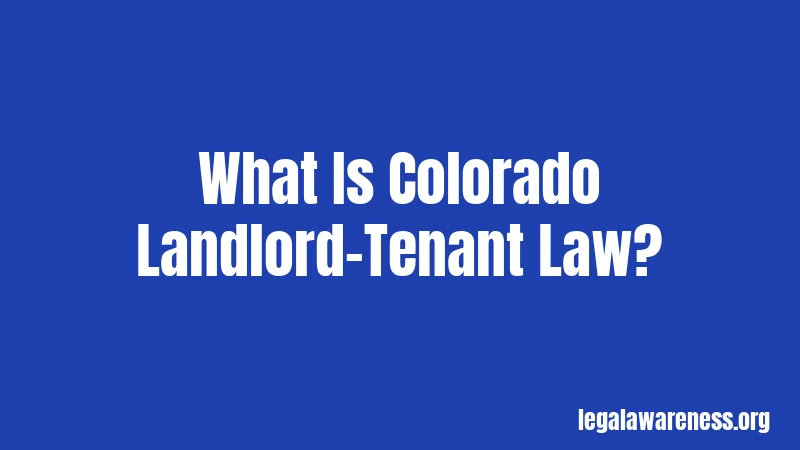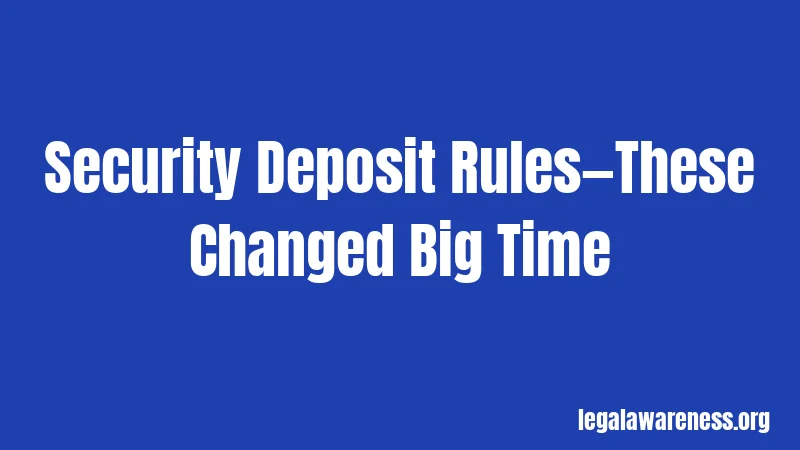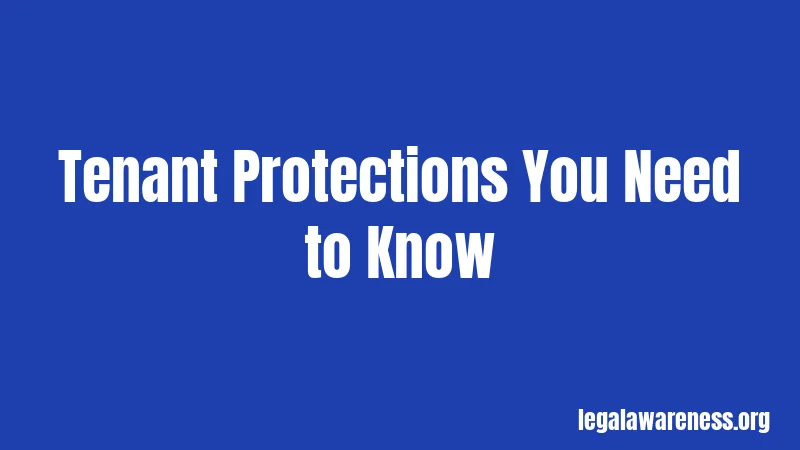Colorado Landlord Laws in 2026: Everything Changes This Year
Most landlords have no idea how much these laws just changed. Seriously. Between 2025 and now, Colorado completely reshaped how rental properties work. The penalties can hit hard. Let’s break down exactly what you need to know.
If you own rental property in Colorado, this is the year to pay attention. New security deposit rules, stricter tenant protections, and enforcement powers just kicked in. Some changes took effect immediately. Others started January 1, 2026. Either way, you need to know them.
What Is Colorado Landlord-Tenant Law?

Think of landlord-tenant law as the rulebook for renting. It defines what landlords can do, what tenants can do, and what happens when someone breaks the rules.
Colorado’s laws protect both sides. Landlords get the right to manage their properties. Tenants get the right to safe, livable homes. But here’s the thing—Colorado has been shifting harder toward tenant protection lately. And 2025 and 2026 brought some major changes.
These laws cover everything from security deposits to evictions to rent increases. They even cover what you can charge for fees. Honestly, this is the part most landlords miss.
The Basic Rules You Need to Know
What Landlords Must Provide
You’re legally required to provide something called a “habitable” rental unit. This means your property must be safe and meet basic living standards.
That includes working utilities. You need functioning electricity, water, heating, plumbing, and hot water. Windows need to keep out weather. Walls and roofs need to be structurally sound. Not sure if something counts? Failing to maintain these basics could get you sued.
Here’s where it gets important: if a tenant reports a problem, you need to respond fast. Very fast. Colorado law says you must communicate within a reasonable time and start repairs. Courts assume you’re breaking the law if certain issues aren’t fixed within 7-14 days. That’s not a suggestion.
What Tenants Must Pay
Rent is due on the date you set in the lease. Late fees are legal, but they’re regulated now. You can charge them, but they can’t be unreasonable or excessive.
Beyond rent, you can legally charge for trash, pest control, or other services. But here’s the catch—you have to disclose everything upfront. Starting January 1, 2026, you must show the total monthly cost in your ads and lease. You can’t hide fees to make the rent look lower.
Lease Requirements
Written leases are required for tenancies lasting 12 months or longer. Even for shorter leases, a written agreement protects you both.
Your lease needs to include basic information: the address, rent amount, due date, and lease duration. It should also explain tenant and landlord responsibilities. Pro tip: include a notice in both English and Spanish explaining where tenants can report problems.
Stay with me here. The lease is your legal protection. Make it clear, make it complete, and make it comply with Colorado law.
Security Deposit Rules—These Changed Big Time

Want to know where new landlords get in trouble the most? Security deposits. The rules just got stricter, and landlords who don’t follow them face serious penalties.
What You Can Deduct
Starting January 1, 2026, normal wear and tear is completely off-limits. Light carpet staining? Can’t charge. Paint scuffs? Not allowed. General aging of the property? Nope.
Cleaning deductions are only allowed if the property is left substantially dirtier than when the tenant moved in. Not just a little dirty. Substantially dirtier.
Here’s an important rule about carpet: if the carpet is older than 10 years, you cannot charge for it at all. Even if it’s damaged. You can only charge for cleaning if something was actually left dirty beyond normal use.
Paint deductions work the same way. You can only charge if there’s substantial damage that goes beyond normal wear. And even then, you can only charge the smallest amount needed to fix the damaged area, not to repaint the whole unit.
What You Cannot Deduct
This list is getting longer, not shorter. You cannot deduct amounts related to domestic violence situations. You cannot charge for repairs that are part of your basic habitability duties. You cannot deduct for pre-existing damage.
Wondering if this applies to you? If you’re holding any security deposit, it applies to you.
The Documentation Requirement
Starting January 1, 2026, here’s what you absolutely must do: create an itemized list of any deductions. For each deduction, provide supporting documentation.
That means photos, invoices, inspection reports, or receipts. Not just a list. Actual proof. Tenants have the right to request a final walkthrough before move-out, and you need to respond to that request.
If a tenant disputes your deductions, they can demand supporting documentation within 14 days. You need to provide it. If you don’t? You could owe triple damages plus attorney fees. That’s huge.
Interest and Timeline
Here’s the good news for Colorado landlords—you don’t have to pay interest on security deposits. But you do have a deadline. You must return deposits within a reasonable time, typically within 30-45 days. Check your local municipal rules because some cities have stricter timelines.
New Penalties
If you wrongfully withhold a security deposit, tenants can recover triple damages. That’s not a typo. They don’t just get their money back. They get three times what they’re owed, plus attorney fees.
Plus, they can sue for up to 18% annual interest if you imposed fees that violated these rules. This part is important: don’t mess with security deposits. The penalties are severe.
Rent Increases and Price Transparency
Okay, pause. Read this carefully.
You can raise rent, but there’s a critical limit: you can only increase it once in any 12-month period. That’s true regardless of whether the lease is written or not, month-to-month or fixed-term.
You must provide written notice at least 60 days before the increase takes effect. That’s two full months’ notice. If you want an increase effective April 1, notice must be given by February 1. No exceptions.
New “Junk Fees” Rules (2026)
Here’s where things get strict: starting January 1, 2026, you must disclose all mandatory fees in advertisements. All of them. No separating out fees to make the rent look lower.
Your ads must display the total monthly cost in one number. That includes rent, trash, pest control, admin fees, parking—everything except utilities.
What you CAN’T charge? Late fees on things that aren’t rent. Services you don’t actually provide. Excessive markups on utilities. Utility markups are capped at 2% or $10 per month.
The law is pretty straightforward: show the real total price. Make it the most visible number. Don’t try to hide anything.
Tenant Protections You Need to Know

Habitability Violations and Rent Reductions
If your property violates the warranty of habitability, tenants have legal protection. That means they can withhold rent or reduce rent payments.
Here’s what changed: if a tenant proves you violated habitability standards, you must reimburse them. That’s true even if they continued paying full rent. The court will reduce their rent retroactively to match what they should have paid for a less-habitable unit.
This is real. A tenant can get back money months or even longer after they paid full rent on a substandard unit.
Domestic Violence Protections
Landlords must now offer repayment plans for rent owed due to domestic violence situations. That’s not optional. If a tenant requests a plan, you must provide one.
The repayment plan requirements are strict. It must be in writing. Monthly payments must be at least $25. The whole plan must conclude within 9 months. You cannot charge fees, interest, or penalties for using the repayment plan.
Rental Assistance Cooperation
New rule: you must make reasonable efforts to cooperate with tenants applying for rental assistance. Failing to respond to requests for information or documentation is now considered an unfair housing practice.
If you violate this, courts can award at least $5,000 in damages. Plus attorney fees. This isn’t just a suggestion—it’s a legal requirement.
Portable Screening Reports
Here’s one that catches landlords off-guard: you must now accept portable screening reports from tenants. If a tenant provides a report that’s valid for 60 days, you have to accept it.
You cannot require tenants to use your chosen screening company. You cannot require them to pay for a new report if they have one from another source.
Additionally, you cannot discriminate based on rental assistance. If a tenant uses a housing voucher or subsidy, you must treat that income source the same as regular income. No exceptions.
New Enforcement Powers and Receivership
Something big happened in 2025. The state created a new enforcement tool called receivership.
The Colorado Attorney General or local municipalities can now take legal action against landlords who violate tenant protection laws. If you have a pattern of neglect in a multifamily property, a court can appoint a receiver to take over.
Think of a receiver as a court-appointed manager. They take control of the property, make repairs, collect rent, and apply it to fixing problems. You lose control of your own asset.
Landlord Action: Conduct regular inspections and document all repairs. Keep records of maintenance requests and responses. This protects you from receivership.
Penalties You’re Actually Facing
Let’s be real about consequences.
If you wrongfully withhold a security deposit, you could owe triple damages plus attorney fees. A tenant could recover thousands of dollars.
If you violate fair housing laws around rental assistance, that’s a minimum $5,000 judgment. Add attorney fees on top.
If you fail to maintain habitability, tenants can reduce rent and demand reimbursement. Over months, that adds up fast.
If you don’t cooperate with rental assistance applications, you’re looking at fines and legal action by the state.
These aren’t small penalties. This isn’t pocket change. The state takes these seriously, and courts award consistently.
Sound complicated? Honestly, it’s not that complicated if you stay organized and compliant.
How to Stay Compliant
Update Your Leases
First thing: review your lease agreement with a lawyer. Make sure it complies with 2025-2026 laws. Include clear disclosure of all fees. State the total monthly cost.
Include a clause that the lease will comply with any changes to applicable law during the tenancy. That covers you if another law changes while a tenant is living there.
Document Everything
Keep detailed records of maintenance requests and responses. Use email and text messages—they create automatic documentation. Take photos of move-in and move-out conditions.
For security deposits, create templates for itemized deductions. Include photos and invoices for every deduction.
Timing Is Everything
Remember: 60 days’ notice for rent increases. 7-14 days to respond to maintenance requests. 30-45 days to return deposits.
Use a calendar or property management software to track these deadlines.
Communication Strategy
Respond quickly to tenant complaints. Don’t make temporary fixes—make permanent repairs. If someone’s unit becomes uninhabitable, offer temporary housing or rent reduction until it’s fixed.
Written documentation of your response is critical. Emails, text messages, work orders—keep everything.
Trust me, this works. When you respond fast and document everything, disputes rarely go to court.
Special Situations
When a Tenant Dies
New law in 2025 clarified what happens when a tenant passes away. You cannot accelerate rent or demand payment of the full lease term.
The lease terminates without penalty. The deceased tenant’s representative can surrender the premises within 30 days of death.
You can take possession without filing an eviction if the property is vacant and belongings are removed. You can retain the security deposit only for actual damage (beyond normal wear).
Mobile Home Parks
Different rules apply to mobile home parks and lot rentals. These are heavily regulated because they’re a unique housing situation.
You can only increase lot rent once per 12-month period. You must provide 60 days’ written notice. Your park must remain actively registered with the state—if registration lapses, any rent increase notice becomes invalid.
The penalties for violations are steep. Make sure your park is registered and in good standing.
Frequently Asked Questions
Can I charge for normal wear and tear? No. Starting January 1, 2026, normal wear and tear is completely off-limits. Light carpet staining, paint scuffs, and general aging cannot be charged to tenants.
What if I discover damage after returning the deposit? You can only charge for damage you documented and listed when the tenant moved out. If you discover it later, you missed your chance to deduct it legally.
Do I have to accept Housing Choice Vouchers? This is a sensitive area. Federal law prevents discrimination based on voucher status, but Colorado amplified these protections. Treat voucher income the same as regular income and cooperate with the program.
How quickly must I respond to maintenance requests? There’s no one-size-fits-all answer. For habitability issues, courts assume you’re violating the law if repairs aren’t made within 7-14 days. For non-emergency requests, respond within a reasonable timeframe.
Can I screen out tenants based on credit scores if they use housing vouchers? No. As of 2025, you cannot use credit scores to evaluate tenants with housing subsidies. You need alternative screening methods.
What’s the penalty if I don’t disclose fees in my ads? Colorado considers this a deceptive trade practice. Tenants can sue for violations, and the state can take enforcement action. The penalties are not small.
Can I keep the security deposit longer than 30 days? Some cities allow up to 45 days, but check local rules. Generally, you need a good reason (itemized deductions with supporting documentation) to keep it longer. Interest doesn’t apply in Colorado, but penalties do.
Final Thoughts
Colorado landlord law just got a major upgrade in favor of tenants. That doesn’t mean you can’t be a successful landlord. It means you need to be organized, fair, and compliant.
Stay on top of these deadlines. Document everything. Make repairs quickly. Disclose all fees upfront. Treat all tenants fairly. That’s really the whole blueprint.
If you’re managing multiple properties or worry about staying compliant, consider hiring a property management company. Many landlords find it costs less than dealing with legal disputes.
Now you know the basics. Stay informed, stay compliant, and when in doubt, ask a lawyer.
References
Official State Resources
- Colorado Attorney General – Tenant Protections
- Colorado Division of Housing
- Mobile Home Park Oversight Program
Recent Legislation (2025-2026)
- HB 25-1090: Residential Leasing Price Transparency
- HB 25-1249: Tenant Security Deposit Protections
- HB 25-1168: Domestic Violence Protections
- SB 25-020: Landlord Enforcement and Receivership
- HB 25-1236: Screening Reports and Fair Housing
Legal Information and Guidance
Property Management Resources
- Keyrenter Denver – Colorado Housing Laws Guide
- Tschetter Sulzer Muccio Law Firm – 2025-2026 Landlord-Tenant Updates
- Spencer Fane – Colorado Landlord-Tenant Law Updates
